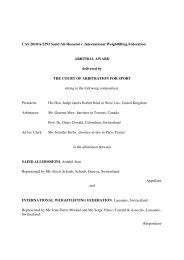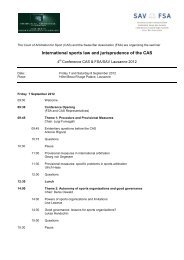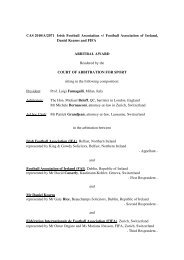(CAS) Bulletin - Tribunal Arbitral du Sport / TAS
(CAS) Bulletin - Tribunal Arbitral du Sport / TAS
(CAS) Bulletin - Tribunal Arbitral du Sport / TAS
Create successful ePaper yourself
Turn your PDF publications into a flip-book with our unique Google optimized e-Paper software.
The Arbitration Agreement provided further that “[t]<br />
he Panel shall determine (…) the law applicable to the merits<br />
in accordance with article R58 of the Code of <strong>Sport</strong>s-related<br />
arbitration”. Under the heading “Law Applicable to the<br />
merits ”, the agreement stated:<br />
“ The Panel shall decide the dispute according to the applicable<br />
regulations and the rules of law chosen by the parties or, in the<br />
absence of such a choice, according to the law of the country in<br />
which the federation, association or sports-related body which<br />
has issued the challenged decision is domiciled or according<br />
to the rules of law, the application of which the Panel deems<br />
appropriate. In the latter case, the Panel shall give reasons for<br />
its decision ”.<br />
The Arbitration Agreement provided for two written<br />
submissions per party. In accordance with the<br />
Proce<strong>du</strong>ral Order of the Panel dated 3 June 2011, the<br />
USOC fi led its Statement of Claim on 17 June 2011;<br />
the IOC fi led its Response (titled “Answer ”) on 15 July<br />
2011; the USOC fi led its Reply on 25 July 2011; and<br />
the IOC fi led its Second Response on 4 August 2011.<br />
The Arbitration Agreement provided in paragraph<br />
3.4 that: “(…) Each party may submit written witness<br />
statements as it deems appropriate. There shall be no live<br />
witnesses and experts (…). No third party will be allowed to<br />
appear at the hearing. Notwithstanding the foregoing, the Panel<br />
may determine otherwise, in accordance with the rule of <strong>CAS</strong>,<br />
should it consider it necessary”.<br />
The Arbitration Agreement provided for the fi ling of<br />
Amicus Curiae Briefs as attachments to either party’s<br />
written submissions. This was done to ensure that<br />
the Panel would have as comprehensive a view as<br />
possible of the potential issues surrounding the IOC<br />
Regulation.<br />
The parties also fi led numerous exhibits and<br />
authorities in support of their positions and<br />
arguments. Some additional materials were submitted<br />
at the hearing.<br />
In accordance with the Proce<strong>du</strong>ral Order issued on<br />
3 June 2011 (the “Proce<strong>du</strong>ral Order ”), the Panel held<br />
a hearing at the <strong>CAS</strong> Headquarters in Lausanne,<br />
Switzerland, on 17 August 2011. At that time, the<br />
parties were given a full and complete opportunity<br />
to make oral argument based upon their written<br />
submissions. At the conclusion of the Hearing,<br />
counsel for both parties agreed that they had been<br />
given a full and complete opportunity to be heard<br />
and so advised the Panel.<br />
Extracts from the legal fi ndings<br />
A. Scope and application of the IOC Regulation<br />
The resolution of this dispute ought to begin with an<br />
analysis of the scope of the IOC Regulation.<br />
The Regulation has no immediate effect on an athlete<br />
who is subject to a suspension under the WADA Code<br />
that either prevents him or her from participating<br />
in qualifying competitions to become a member<br />
of a National Olympic team or coincides with the<br />
Olympic Games themselves. Such an athlete would<br />
not be able to participate in that particular Olympic<br />
Games because of the suspension under the WADA<br />
Code. However, that same athlete would be affected<br />
by the IOC Regulation at the time of the subsequent<br />
Olympic Games, assuming the prior suspension was<br />
of more than six months’ <strong>du</strong>ration and was served in<br />
the four-year period prior to that Olympic Games.<br />
The IOC Regulation applies to all athletes of the<br />
Olympic Movement, but only becomes a consequence<br />
at the point a decision is made with respect to that<br />
athlete’s acceptance, nomination, and accreditation<br />
to the Olympic Games. In other words, at the point<br />
when an NOC has selected an athlete to be a part<br />
of its Olympic Team and seeks the IOC’s approval<br />
for its nomination, the Regulation starts to have a<br />
direct effect. The existence of the Regulation might<br />
well mean that an NOC will not seek to nominate an<br />
athlete who falls within its terms, rather than propose<br />
the athlete and have the nomination subsequently<br />
rejected by the IOC. Nevertheless, it is at the point<br />
that the IOC either accepts or denies the nomination<br />
that a decision is made, pursuant to Rule 45.2 of the<br />
OC, and that the IOC Regulation has its effect of not<br />
permitting participation of an athlete as outlined in<br />
the OC.<br />
It is worth noting that the effects of a suspension<br />
under the WADA Code that overlaps with an<br />
Olympic Games or the qualifi cation for that Games<br />
and of the application of the IOC Regulation are<br />
identical: in both circumstances, an athlete is denied<br />
the possibility to participate in the Olympic Games.<br />
A WADA Code suspension, of course, also has<br />
a broader effect as it bans participations in other<br />
competitions as well.<br />
The IOC Regulation can also affect a team in a<br />
team sport, as an athlete subject to the application<br />
of the Regulation can be on the national team for all<br />
competitions other than the Olympic Games. Thus,<br />
there may be a ripple effect to the Regulation that<br />
extends beyond the athlete to whom the Regulation<br />
is applied.<br />
Jurisprudence majeure / Leading cases<br />
-<br />
145





